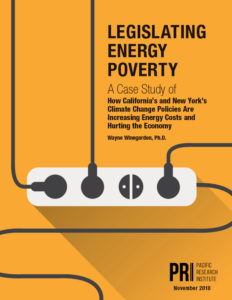Legislating Energy Poverty Shows Market-Based Policies More Effective in Cutting Emissions
The big government approach to fighting ‘global warming’ taken by California and New York hits working class and minority communities the hardest, a new report released today by the California-based free-market think tank, the Pacific Research Institute, concludes.
“Overzealous global warming laws and regulations are taking away jobs and opportunity and increasing energy poverty for those who can’t afford higher fuel and electricity bills,” said Dr. Wayne Winegarden, PRI senior fellow in business and economics and author of Legislating Energy Poverty.
Click here to download a copy of Legislating Energy Poverty.
Legislating Energy Poverty reviews the impact of global warming policies adopted in California and New York, such as unrealistic renewable energy goals, strict low carbon fuel standards, and costly subsidies for buying higher-priced electric cars and installing solar panels. The report finds that, collectively, these expensive and burdensome policies are dramatically increasing the energy burdens of their respective state residents.
Among the specific findings:
• Average state electricity prices in California are the highest in the lower 48 states, and electric prices in New York are the nation’s sixth-highest.
• Monthly power bills in inland California are 57 percent higher on average in the summer months than in coastal parts of the state.
• California drivers pay the nation’s 2nd-highest gas prices, while New York drivers pay the 14th-highest.
• The Golden State has the nation’s highest poverty rate, while the Empire State has the nation’s seventh-highest poverty rate.
Winegarden compares the efforts of states like New York and California, which have adopted big government approaches to fighting global warming, with states that have embraced market-based policies. Surprisingly, states like West Virginia and Ohio have seen larger percentage declines in emissions than California and New York.
“These big government policies haven’t been shown to be more effective in reducing emissions. Ohio and West Virginia show that you don’t have to impose new taxes, create big government programs, or increase energy burdens to cut emissions,” Winegarden said. “Policymakers in Sacramento and Albany should learn from these states and embrace market-based policies.”
Dr. Wayne Winegarden is a senior fellow in Business and Economics at the Pacific Research Institute, and the principal of Capitol Economic Advisers.


